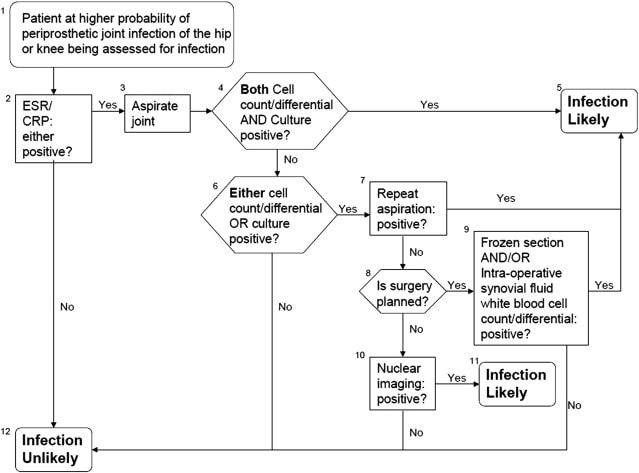Infections of Hip and Knee Replacements
As more and more joint replacements are performed in the world, we will unfortunately be seeing more volume of infections in the upcoming years. While our surgeons performances are far better than the national average for infections, every surgeon will unfortunately have one. There are a host of risk factors for infections such as BMI >50, diabetes, smoking, chronic steroid use, chronic kidney disease, HIV and many others. Our surgeons optimize every patient prior to surgery to reduce the risk of infections, but it is impossible to get to none. We strive for no infections more so than anyone else, but we are well equipped to identify them early and save joint replacements.
How do I know if my joint is infected?
Our surgeons follow the American Academy of Orthopedic Surgery crtieria for periprosthetic (joint) infections. The AAOS has created the algorithm below to make it easier for surgeons to identify and treat infections. Signs and symptoms include pain at night, unexplained swelling, pain with every step, fevers, chills and nightsweats. Some patients will see redness around the joint while others may not. Every joint that remains painful must be worked up as some simple tests are able to identify likelihood of infections. Simply based on two blood tests, the ESR and CRP, a surgeon can then follow the workup tree to make the diagnosis of an infection.
Treatment
Infections can be very difficult depending on how long it has been there and what bacteria is causing the infection. In general terms, the following are some usual scenarios in which infections are managed.
- If an infection is known to have occured within 6 weeks of diagnosis or surgery, a thoroughly "clean" out procedure of the knee is performed and the plastic and all components that are easily removable are exchanged for new ones.
- If an infection has been chronic or greater than 6 weeks, the full hip or knee replacement will have to be removed and a 3 month placement of an antibiotic spacer will be placed to help reduce the infection to allow a revision surgery and placement of a new hip or knee replacement
- Infectious Disease doctors will be involved and a PICC line- a special IV- is used to give antibiotics for a minimum of 6-8 weeks to help get rid of the infection
The leaders in fighting infection
Our surgeons are among the best at eradicating infections. Our surgeons use all of the newest cleaning techniques and the highest amount of antibiotic concentrations in our antibiotic spacers of anyone in the country. Makes sense right? The more antibiotic, the better and more likely the infection is to cure.
We also understand the severity and disability an infection can cause. We are leaders in helping you get your life back through these extremely difficult times. We will help provide you with assistive devices for walking, assist in obtaining consultations with Infectious Disease doctors who specialize in orthopedic infections and most importantly, we are available the entire time during your post-operative care. We are here for you.
We also understand the severity and disability an infection can cause. We are leaders in helping you get your life back through these extremely difficult times. We will help provide you with assistive devices for walking, assist in obtaining consultations with Infectious Disease doctors who specialize in orthopedic infections and most importantly, we are available the entire time during your post-operative care. We are here for you.
Office HoursMon-Fri: 9AM-5PM
|
Telephone |
High School Football Season Added Coverage HoursSaturdays During High School Football Season
Injury Clinic is for INJURED PLAYERS ONLY. Snellville ONLY. 9AM-10AM MEDIA ROOM |



